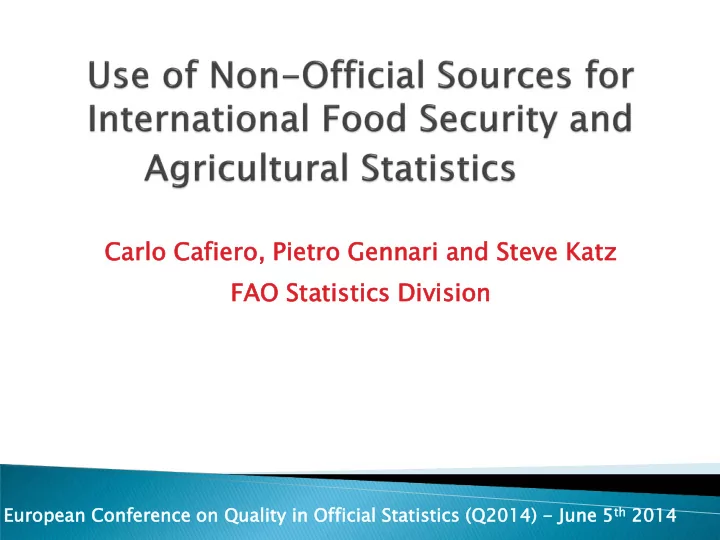

Carlo o Cafiero ro, , Pietro tro Gennari nari and Steve ve Katz tz FAO O Stati tistics stics Divi vision sion European ean Conference ference on Qual ality ty in Offici cial al Statistic tics (Q2014) 2014) - June ne 5 th th 2014 14
Background and Context Role of IOs as Producers of Official Stats Why and When to use Non-Official Sources FAO Examples “Voices of the Hungry” Project as Case -Study Reflections and Conclusions
Te Tensio sion n bet etween ween NSO SOs s and d IOs s due e to data a discrepan crepancies es and d use e of non-of offi fici cial al sources rces (HDR, MDG database, Big Data) Result ulting ing in specifi ecific UNSC recommenda mendations: ions: 37 th Session (2006) – On imputation and SCB ◦ 42 nd Session (2011) – On enhanced coordination of ◦ statistics within the UN system CCSA SA discussions cussions on imputatio utation n practic ctices es and use e of non-of offic ficial al sources rces 2006, 2009, 2010, 2011, 2012 ◦ 2013 : adoption of “Recommended Practices on the Use ◦ of non- Official Sources in International Statistics”
Clear role of national governments for official statistics; Ro Role of IOs more co contro troversi rsial al Widespread view: limite ited d to co comp mpiling ling existi sting ng gover vernm nmental ntal stati tistics stics SDMX guidelines: official icial stat atis istics tics al also o ap apply y to Inte tergover rgovernm nmental ntal Organizations nizations Assumes Member ber States s endorse rse stati tistica stical l progr gram ammes mes of IOs, which is not always the case Added d value ue: transformation of national data into international “Global Public Goods”, standardized and comparable across countries Requires: dedicated attention to quality ity and good d gover verna nanc nce
To ensure data harmonization and comparability across countries and regions To validate official data, to increase their accuracy and comprehensiveness ◦ Politically sensitive data may affect availability/quality of some official sources To fill missing values/overcome confidentiality issues To produce indicators not covered by official statistics: ◦ Difficulty of the NSS to address new demands (real-time data, new thematic areas) But ON ONLY LY when all possibilities of using national data have been exhausted
Fertilizer tilizer Production, oduction, Trad ade e and nd Consu nsumpt ption ion ◦ Main source is official statistics from countries, but additional data from the International Fertilizer Association (MoU) Early rly Warni rning ng and d Emergen ergency y Preparedne eparedness ss Ne Needs ds Real-time data not available from official sources ◦ Developing countries affected by emergencies lack the ◦ expertise needed Data from news agencies, extension services, satellite ◦ images; Crowdsourcing: Price data tool collects price information ◦ for food products on retail/wholesale markets Voices es of the Hu Hung ngry ry Pr Projec ject t as a Case e Stud udy
Iss ssue ue being ing Addres dressed sed Monitoring Food Insecurity is crucial to fight hunger Post 2015 Development Agenda requires creation of new indicators for global and national monitoring (food access) Global Monitoring cannot be based on national sources in the short-term Voices of the Hungry Project addresses this gap
Methodol hodology gy and d Be Benefi efits ts ◦ Direct measure of people’s food insecurity in a timely and cost-effective way ◦ Short questionnaire as integral part of annual survey conducted by Gallup Inc. in 150 countries worldwide ◦ Based on nationally representative samples ◦ Can help in assessing emergency needs after famine or natural disasters ◦ Recommended as a key indicator for the monitoring framework of the Post 2015 Development Agenda ◦ Governments to adopt the indictor for targeted intervention, and monitoring/measuring impact of policies/programmes
Quality ity Assura rance nce Mechanisms isms ◦ Ri Rigoro gorous us UN Procu ocureme ement nt Rul Rules s adopted for the selection of data supplier ◦ Methodology hodology Field eld-Tested: Tested: initially in 4 African countries ◦ Vali alidation tion St Studies udies: before adoption of a universal Scale of measurement ◦ Quality ality St Stamp: mp: FAO responsible for integrity and comparability of the different questionnaire language versions ◦ Su Sustainabi tainabilit lity: y: Long-term contract with Gallup Inc.; World Bank and WHO have similar project arrangements ◦ Capa paci city ty Deve velopmen lopment: t: FAO to assist countries to include the Scale in future national household surveys; countries to eventually to take over data collection function ◦ Extern ernal al Review: view: All micro-data and methodology for its analysis will be publicly available
IOs add value as provider of internationally comparable data as Global Public Goods Use of non-official data with the ultimate goal of providing higher quality and wider scope of service Various compelling reasons, including to fill gaps or meet emerging needs Choice of official or non-official sources to be based purely on professional considerations Be combined with capacity development work for eventual national handover and sustainability
Use of non-official sources may create tension between IOs and NSOs Instruments needed to mitigate this tension: ◦ Full disclosure of methods/sources ◦ Quality assurance frameworks ◦ Stronger country involvement Particularly, strengthened statistics governance systems where Members endorse the statistical programmes of IOs and peer-review data FAO: new QAF adopted; Global Commission on Statistics to be established in 2015
Recommend
More recommend